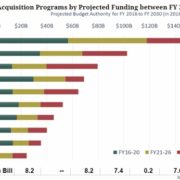 Budget cuts and a lack of direction have created an anxious atmosphere for many Defense vendors. Recent events, however, provide cause for cautious optimism. For one thing, the 2015 Defense budget made it through the Senate appropriations committee. This is a hopeful sign that the government may avoid the dangerous, near-default showdowns that have made supplying the military so difficult and unpredictable. Defense Industry Daily has a nice summary on the latest budget. One detail that caught my eye, the beloved “warthog” (A-10C) is getting an upgrade.
Budget cuts and a lack of direction have created an anxious atmosphere for many Defense vendors. Recent events, however, provide cause for cautious optimism. For one thing, the 2015 Defense budget made it through the Senate appropriations committee. This is a hopeful sign that the government may avoid the dangerous, near-default showdowns that have made supplying the military so difficult and unpredictable. Defense Industry Daily has a nice summary on the latest budget. One detail that caught my eye, the beloved “warthog” (A-10C) is getting an upgrade.
Another cause for optimism for Defense vendors is an announcement that mid-year projections for procurement and research are $26 billion higher than before. However, not everyone trusts these projections. Below, we reprint an article than originally appeared in Bloomberg Government.
Defense Firms To See $26b More In Outlays By Sept. 30, DoD Says
Revised Pentagon mid-year projections call for $26b more in procurement, research outlays by Sept. 30 than first estimates, according to newly disclosed figures.
Pentagon’s on-paper estimate now projects spending $110.7b on procurement by end of fiscal yr, up from $92.1b April forecast; as well as $63.3b in research, up from $56b, according to Pentagon spokesman Navy Commander Bill Urban.
Military personnel outlays drop to $149.5b from $154.2b; operations and Maintenance slip to $246.3b from $272.8b.
Projections not outlined in July 11 OMB Mid-session Review.
Industry analysts in April said defense spending might plunge, based on Pentagon’s “Green Book” blueprint indicating drop in outlays for weapons, research of combined 18.5% compared with FY13.
Todd Harrison, defense analyst for non-partisan Center for Strategic and Budgetary Assessments, says “new outlay projections” mean “near-term will not be so bad for U.S. defense firms as DOD previously projected.”
“However, I suspect most defense firms were not basing their internal projections on DOD’s prior outlay forecast, so it may not mean any material change for these companies,” he says.
“Companies have dismissed the projected drop and supported their own guidances,” says Roman Schweizer, defense policy analyst with Guggenheim Securities.
“Change may improve sentiment for the sector but not affect financial performance,” Schweizer says.
Schweizer says larger question is: given the revision can the Pentagon “Green Book projections be trusted?









